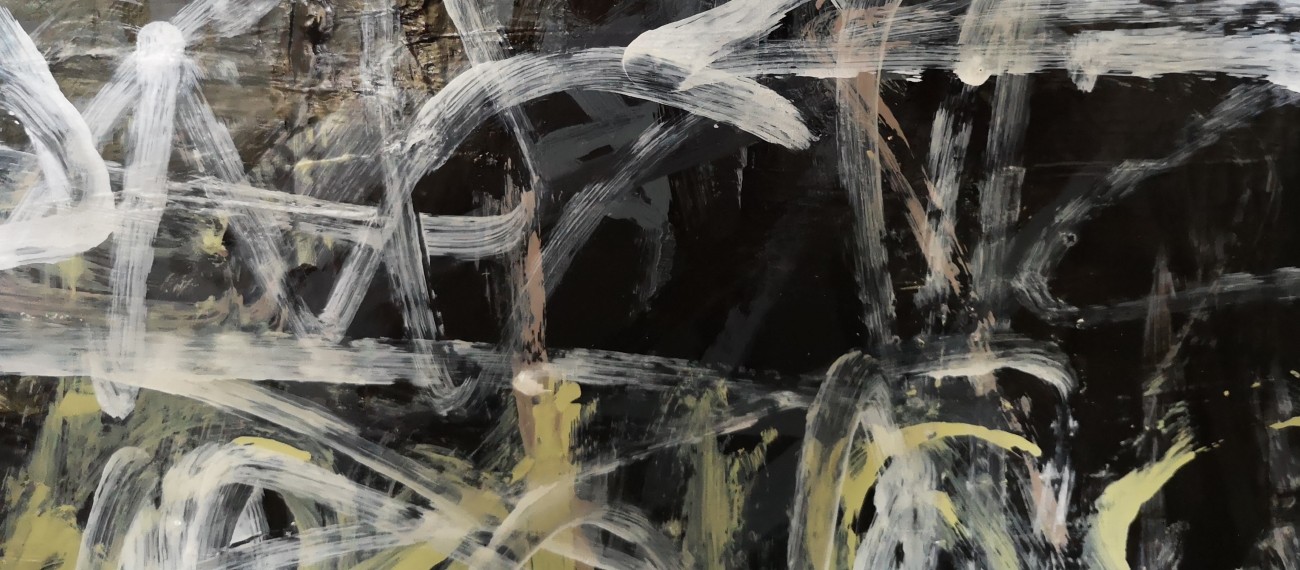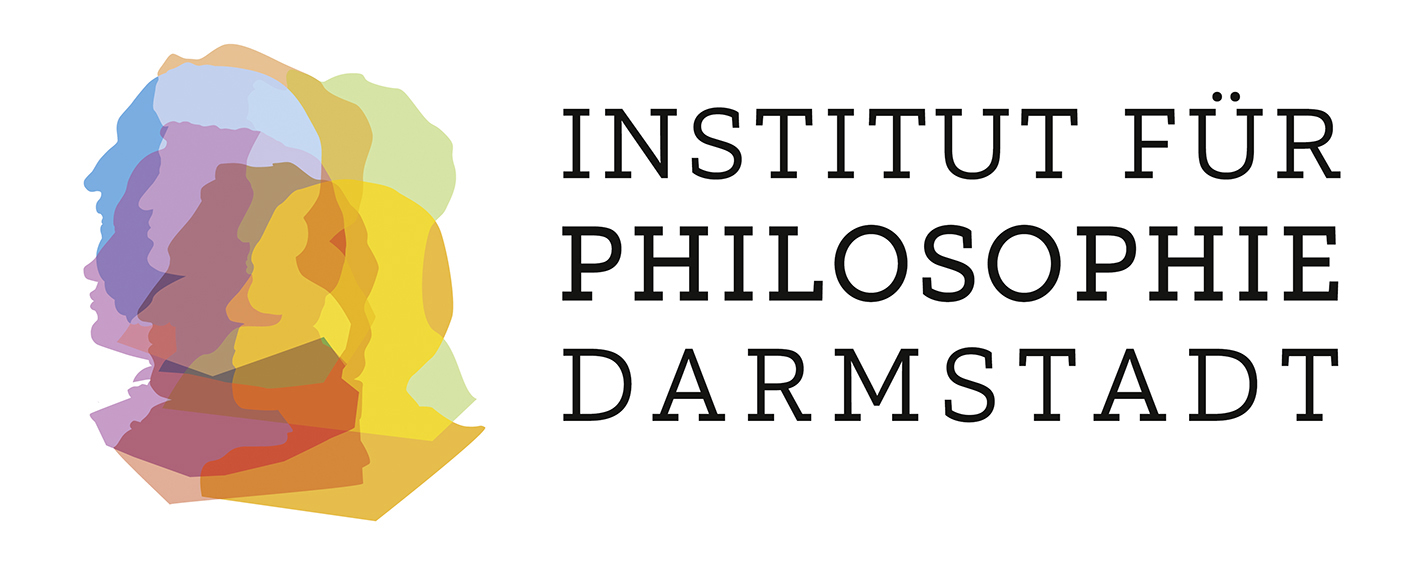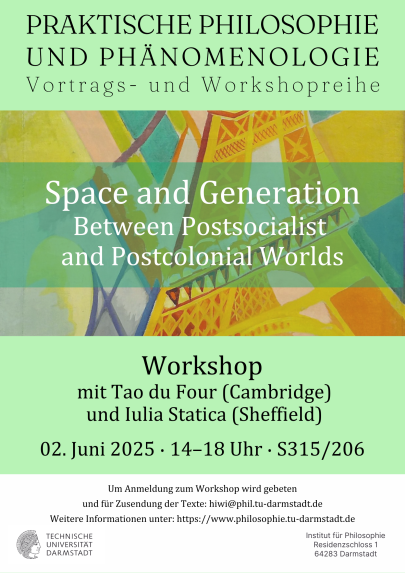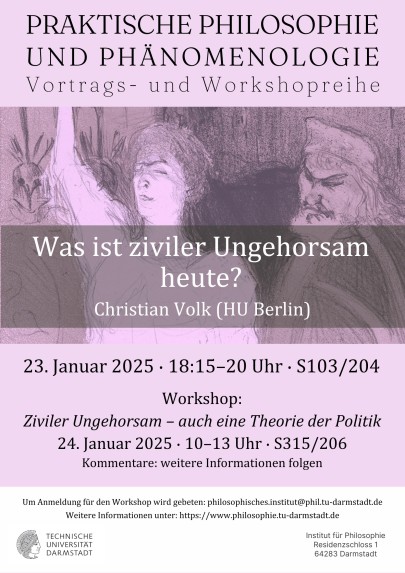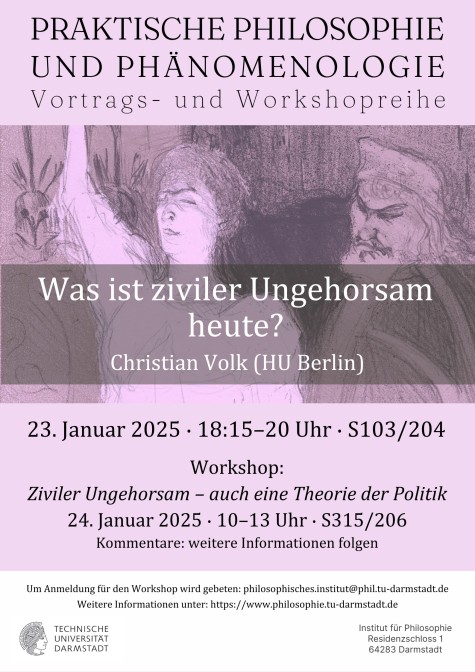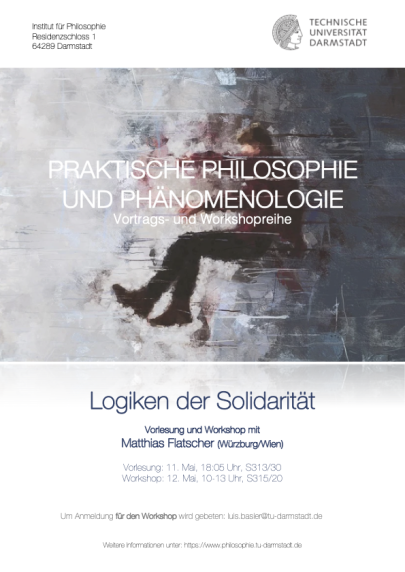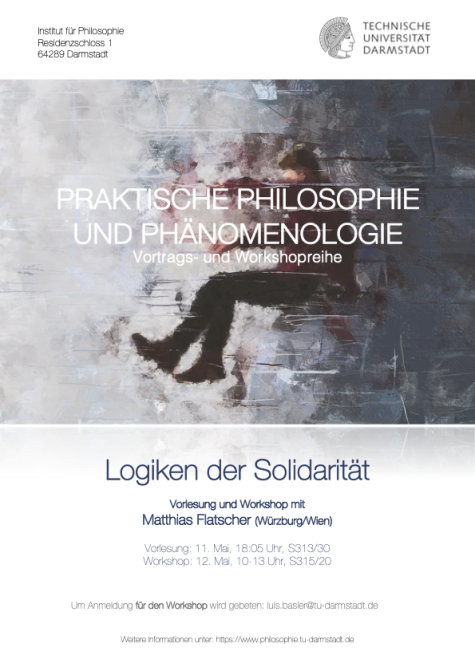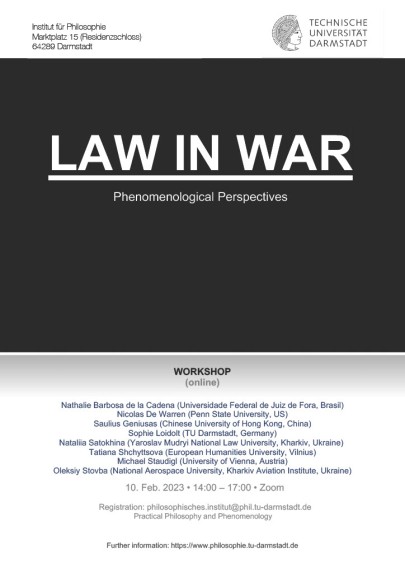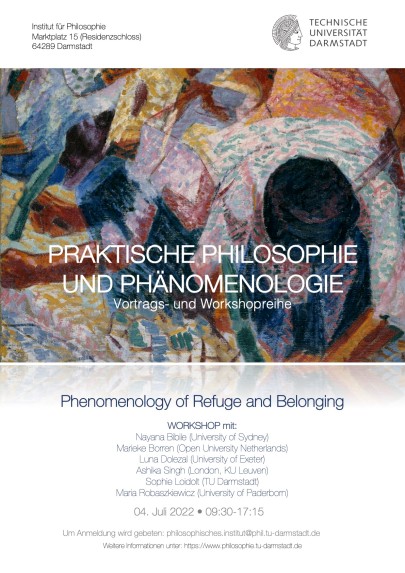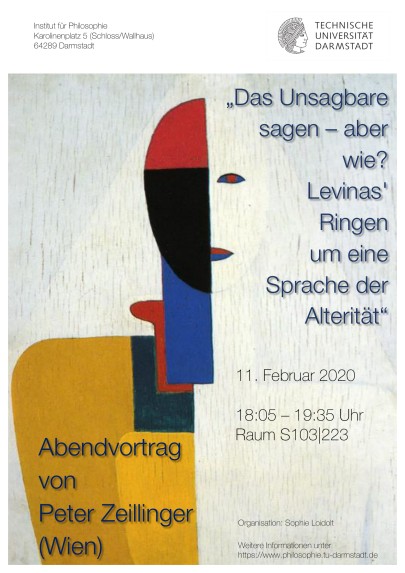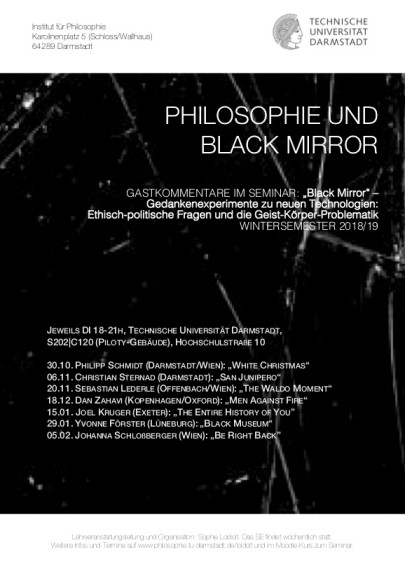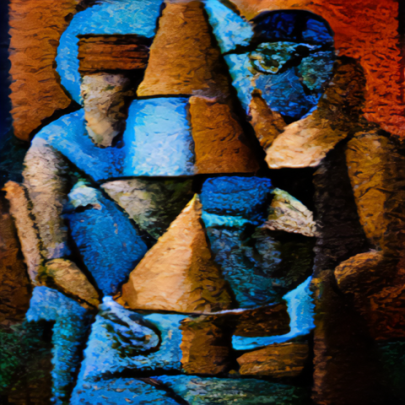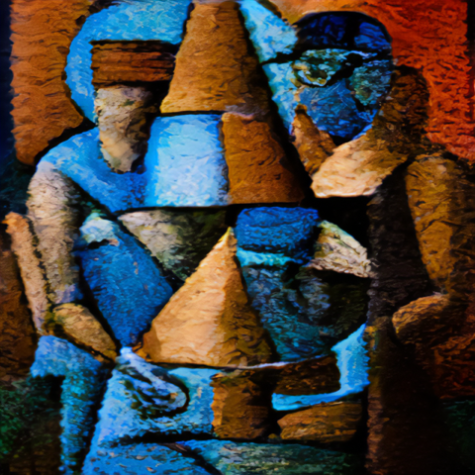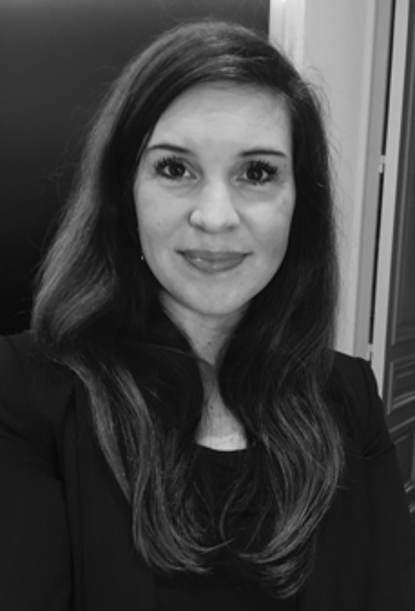Events:
Practical Philosophy and Phenomenology
Lecture- and Workshop-Series: Practical Philosophy and Phenomenology (TU Darmstadt)
- 23./24. Juni 2025: Hamid Taieb (HU Berlin): “Sekundäre Qualitäten und Erkenntnistheorie”
- 2. Juni 2025: Tao du Four (University of Cambridge) und Iulia Statica (University of Sheffield): „Intersubjective and intergenerational understandings of architecture, landscape and territory“
- 8./9. Mai 2025: Shmuel Lederman (Haifa University): “Arendt's writings on Zionism”
- 23./24. Januar 2025: Christian Volk (HU Berlin): “Ziviler Ungehorsam”
- 21./22. November 2024: Matthias und Johanna Schlossberger (Frankfurt (Oder)): “Konservative Revolution”
- 2./3. Mai 2024: Jörg Sternagel (Konstanz): “Auf dem Weg zum Anderen. Ethik der Alterität.”
- 16./17. Januar 2024: Dirk Stederoth (Kassel): “Wir Avatare. Zur Introjektion des Digitalen im Menschen”
- 23./24. November 2023: Steffen Herrmann (Hagen): “Demokratischer Streit. Eine Phänomenologie des Politischen”
- 24. Oktober 2023: Kristian Köchy (Kassel): “Beseelte Tiere”
- 11./12. Mai 2023: Dr. Matthias Flatscher (Würzburg/Wien): “Logiken der Solidarität”
- 10. Februar 2023: Prof. Dr. Sophie Loidolt (TU Darmstadt): “Law in War: Phenomenological Perspectives”
- 8./9. April 2021: Dr. Gerhard Thonhauser (TU Darmstadt): “Sein und Zeit. Ein systematischer Kommentar” (Buchprojekt)
- 16./17. Januar 2020: Prof. Dr. Julian Hanich (Universität Groningen): “Collective Viewing, Joint Deep Attention and the Ongoing Value of the Cinema”
- 11./12. Juli 2019: Prof. Dr. Oliver Marchart (Wien): “Demokratie demokratisieren. Zur Geschichte und Zukunft radikaler Demokratie”
- 1./2. November 2018: Prof. Dr. Inga Römer (Université Grenoble Alpes): “Das Begehren der reinen praktischen Vernunft. Kants Ethik in phänomenologischer Sicht”
Sekundäre Qualitäten und Erkenntnistheorie
23./24. Juni 2025: Workshop und Vortrag von und mit Hamid Taieb (HU Berlin)
Workshop:
Farben in der frühen Phänomenologie
23. Juni 2025, 18 – 20 Uhr, S315/206
Vortrag:
Phänomenologische Einsichten in die sinnliche Welt
24. Juni 2025, 11:40 Uhr – 13:10 Uhr, S101/A4
Für Zusendung der Texte bitten wir um Anmeldung unter hiwi[at]phil.tu-darmstadt.de
Space and Generation: Between Postsocialist and Postcolonial Worlds
2. Juni 2025: Workshop mit Tao du Four (Cambridge) und Iulia Statica (Sheffield)
Space and Generation: Between Postsocialist and Postcolonial Worlds
Dr. DuFour und Dr. Statica arbeiten im Bereich der Architekturgeschichte und Architekturtheorie und verbinden dies mit Philosophie, ethnographischen Methoden und Dokumentarfilm. Im Workshop werden sie Teile ihrer Filme präsentieren und wir werden anhand ihrer Texte in eine gemeinsame Diskussion kommen.
Der Dokumenentarfilm My Socialist Home (Iulia Statica, Adrian Catu) setzt sich den Erfahrungen vor allem von Frauen im postsozialistischen Wohnungsbau auseinander; Possible Landscapes (Natalie Melas, Kannan Arunasalam, Tao DuFour) untersucht Erfahrungen geschichtlicher und generativer Umwelt in der postkolonialen Karibik mit Schwerpunkt auf Trinidad und Tobago.
Der Workshop findet im Rahmen der Reihe Praktische Philosophie und Phänomenologie statt.
2. Juni 2025, 14 – 18 Uhr, Institut für Philosophie (Glockenbau, Wissenschaftsschloss Darmstadt) im Besprechungsraum
Kontaktieren Sie uns gerne für eine Zusendung der Texte und Links zu den Filmen (unten finden Sie Angaben zu den Texten und weiterführende Links). Für den Workshop bitten wir um eine kurze Anmeldung unter: hiwi@phil.tu-…
----------
YouTube-Video (opens in new tab)
DuFour, Tao. (2023) 'Environmentality: A Phenomenology of Generative Space in Husserl.' Research in Phenomenology 53: 331-358.
Statica, Iulia: “The Phantasmagoria of the Communist Interior”, in: Urban Phantasmagorias. Domesticity, Production and the Politics of Modernity in Communist Bucharest, Routledge 2024.
Statica, Iulia: “From Biopolitics of the Lived Body, Maternity, Reproduction and Domestic Space in Socialist Bucharest (1965–89)”, published in Architectural Histories.
Dr. Iulia Statica (opens in new tab)
Dr. Tao DuFour (opens in new tab)
Arendt's writings on Zionism
8.-9. Mai 2025: Vortrag und Workshop von und mit Shmuel Lederman (Haifa University)
Vortrag:
“Reading Arendt in Israel: Reflections on Zionism and Paths not Taken in the Shadow of October 7 and the War in Gaza.”
8. Mai 2025, 18 – 20 Uhr, 313/30
Workshop:
Arendts Writings on Zionism
Am nächsten Tag findet von 10 bis 13 Uhr (Raum S315/206) zudem ein Workshop mit Shmuel Lederman zum Thema statt. Im Workshop werden Luise Henckel (MLU Halle) und Tim Stosberg (Passau) Impulsreferate halten.
9. Mai 2025, 10 – 13 Uhr, S315/206
Für Zusendung der Texte bitten wir um Anmeldung unter hiwi[at]phil.tu-darmstadt.de
Konservative Revolution
21./22. November 2024: Vortrag und Workshop mit und von Matthias und Johanna Schlossberger (Frankfurt (Oder))
Vortrag:
„Konservative Revolution". Herkunft und Gegenwart eines rechten Kampfbegriffs
21. November 2024, 18 – 20 Uhr, S103/204
Workshop:
Politik und Ethik bei Aurel Kolnai
22. November 2024, 10 – 13 Uhr, S315/206
Auf dem Weg zu Anderen. Erkundungen des Medialen
02./03. Mai 2024: Vortrag und Workshop von und mit Jörg Sternagel (Konstanz)
Vortrag
Wie lässt sich das Mediale erkunden? Indem alle den Anderen, den sie umgebenden Menschen gegenüber ihre Position darlegen, sie entfalten, sie frei legen und durch sie aktivieren. Entre-tenir (unter-halten)? Dazwischen halten, im Dazwischen halten, ein Dazwischen in den Händen, in den Worten und Gesten halten. Genau diese Bewegung versucht der Vortrag in das Skript, in den Hörsaal und in die Diskussion zu übertragen, um herauszustellen, dass das Mediale nicht das Eine ist, weswegen es auch nicht nur auf das Technologische reduziert werden kann, sondern im Denken einer Situation in-mitten von Theorie und Praxis dazwischen wirkt, durch auf dem Weg genutztes oder auch ungenutztes Potenzial in Perspektivierungen. Wir gewinnen so, über ein derart vorgeschlagenes Denken des Medialen, unsere Beschaffenheit aus dem Dazwischen des unter uns. Womit wir uns im Erkunden des Medialen auch auf andere, uns umgebende Lebewesen zubewegen, sie berücksichtigten, sie erkennen und anerkennen, auf sie eingehen, uns selbst in Zurückhaltung üben und damit unserem Denken des Medialen eine ethische Dimension verleihen, die zwar bei mir, beim Ich anfängt, aber Anderswo, bei Anderen beginnt, wie gleichsam in einer Bewegung auf Andere zu, indem wir das Dazwischen herauslösen, um Andere und Anderes hervortreten zu lassen, im Weiterdenken von Alterität.
2. Mai 2024, 18:05-19:35 Uhr, S103/204
Workshop
Der Workshop findet zu Herrn Sternagels Buch Ethik der Alterität. Aisthetik der Existenz.Dasselbe können Sie hier (opens in new tab) einsehen.
Mit Kommentaren von Vanessa Ossino (Köln) und Tanja Wischnewski (Hildesheim).
3. Mai 2024, 10 – 13 Uhr, S315/206
Um Anmeldung wird gebeten:
Wir Avatare. Zur Introjektion des Digitalen im Menschen
16./17. Januar: Vortrag und Workshop von und mit Dirk Stederoth (Kassel)
Vortrag
Zur Introjektion des Digitalen im Menschen
16. Januar 2024, 18:15 Uhr, S313/215
Workshop
zum Buch Reale Avatare. Am folgenden Tag findet ein Workshop mit Dirk Stederoth statt. Dort wird dessen gleichnamiges Buch besprochen. Es ist hier (opens in new tab) aufrufbar.
17. Januar 2024, 10-13 Uhr, S315/206
Um Anmeldung nur für den Workshop! wird gebeten! Mail: philosophisches.institut@phil.tu-darmstadt.de
Demokratischer Streit. Eine Phänomenologie des Politischen
23./24. November: Vortrag und Workshop von und mit Steffen Herrmann (Hagen)
Vortrag
Was ist demokratischer Streit? Ist die demokratische Gesellschaft am Ende? Der Glaube an die Möglichkeit kollektiver Selbstregierung scheint heute angesichts populistischer und regressiver Politiken erloschen. Als Antwort auf diese Karise gilt es, Demokratie neu zu denken. Dafür entwickelt die vorliegende Studie im Ausgang von Hannah Arendt ein System des demokratischen Streits als Streit um den Demos, das Kratos und die Doxa. Ausgehend von diesen drei Grundformen der politischen Auseinandersetzung bezieht sie mit radikalen, republikanischen und rhetorischen Demokratietheorien Stellung und zeigt Möglichkeiten einer phänomenologischen Kritik auf, mit denen sich tiefe Meinungsverschiedenheiten demokratisch austragen lassen.
23. November 2023, 18:05 Uhr, S313/215
Workshop
zum Buch Demokratischer Streit. Am folgenden Tag findet ein Workshop mit Steffen Herrmann statt. Dort wird dessen gleichnamiges Buch besprochen. Es ist hier aufrufbar.
24. November 2023, 10-13 Uhr, S315/206
Steffen Herrmann wird am 31. November und 01. Dezember außerdem zu Gast im Buchforum der Universität Wien sein. Weitere Informationen finden Sie hier.
Um Anmeldung nur für den Workshop! wird gebeten! Mail: philosophisches.institut@phil.tu-darmstadt.de
Critical and Political Phenomenology in Debate
In cooperation with the FernUniversität Hagen and the University of Cologne.
In phenomenology, two lines of thought have recently emerged, both dealing with the experience and structures of political conflicts and with social relations of domination: critical phenomenology on the one hand and political phenomenology on the other. Both claim to respond to the crises of the present and to inner-phenomenological desiderata.
Classical phenomenology, despite its turn to lived experience and embodied subjectivity, has failed to adequately address these dimensions of experience. Both political and critical phenomenology aim to compensate for this deficiency. They aim to show that phenomenology not only analyzes consciousness, subjectivity, lifeworld, and intersubjectivity, but can also illuminate the multiple experiences of marginalized subjects, historicize perceptual schemas, and thematize political experiences.
The online lecture series is intended to open a debate on critical and political phenomenology in which, on the one hand, methodological and content-related differences are to be worked out and, on the other hand, common goals are to be brought into view. In particular, the advantages and benefits of a critical-political phenomenology over constructivist and normative theories of the social and political will be discussed.
The invited speakers will each develop their concept of a critical and/or political phenomenology in a lecture. Each lecture will be accompanied by a response and then opened to public discussion: In this way, critical and political phenomenology will be “in debate.”
Hosted by Thomas Bedorf (Hagen), Thiemo Breyer (Cologne), Steffen Herrmann (Hagen) and Sophie Loidolt (Darmstadt).
Invited speakers:
16.10. Elisa Magrì (Boston College)
Describing the project of critical phenomenology: challenges and promises
Response: Vanessa Ossino (University of Cologne)
30.10. Gail Weiss (George Washington University)
Curating Embodied Resistance Through Social Media: The Role of Virtual Audiences in the Fight for Social Justice
Response: Hannes Wendler (University of Cologne)
20.11. Johanna Oksala (Loyola University Chicago)
A Critical Phenomenology of Climate Change
Response: Marcus Düwell (TU Darmstadt)
11.12. Lanei Rodemeyer (Duquesne University)
Analyzing the ‘Critical’ in Phenomenology
Response: Gerhard Thonhauser (TU Darmstadt)
15.01. Marieke Borren (OU Netherlands)
Understanding embodied agonistic politics. Perspectives from political and critical phenomenology
Response: Steffen Herrmann (FernUniversität Hagen)
05.02. Neal DeRoo (ICS Canada)
The Case for a Phenomenological Politics
Response: Thomas Bedorf (FernUniversität Hagen)
Beseelte Tiere
Vortrag: Ausdrucksgestalten. Die Brücke zum Tier
24. Oktober 2023, 18:15–20:00, S 3 13/215
In seinem im Jahr 2022 erschienen Buch Beseelte Tiere Umwelten und Netzwerke der Tierpsychologie befasst sich Kristian Köchy mit einer Disziplin, die vor dem Hintergrund der modernen Verhaltensbiologie wie der Humanpsychologie abwegig erscheinen mag: der Ende des 19. Jahrhunderts entstandenen Tierpsychologie. Können wir Menschen einen Zugang zur Psyche der Tiere erlangen? Ungeachtet dessen, ob eine Beantwortung dieser Frage möglich ist, sind die vielfältigen und äußerst experimentellen Versuche, sich einen Zugang zur tierischen Psyche zu verschaffen, nicht nur aus naturwissenschaftlicher Perspektive interessant – sie berühren ebenso anthropologische, erkenntnistheoretische und metaphysische Fragen. Entsprechend widmet sich Köchy in seinem Buch Vertretern verschiedener Disziplinen: Biologen wie Jean-Henri Fabre und Jakob von Uexküll; Philosophen wie Henri Bergson und Helmuth Plessner; Psychologen wie Kurt Goldstein und Kurt Lewin. Die Analyse geht damit weit über den Bereich der Tierpsychologie hinaus, indem sie deutlich macht, dass die jeweiligen Vorstellungen über Tiere stets mit bestimmten Menschenbildern korrespondieren.
Workshop: Workshop zum Buch Beseelte Tiere
24. Oktober 2023, 14:30–16:00, S 3 15/206
Respondenzen: Sonja Daum (TU Darmstadt) und Marco Tamborini (Albert-Ludwigs-Universität Freiburg)
Talk: Affective Capacity • Potential Image of Atmosphere in Space
Tuesday, October 17 // 06:15 pm // S313/25
Serkan Can Hatıpoğlu is visiting the institute as part of the Erasmus+ program. He works at the Eskişehir University of Technology in Turkey. His disciplinary affiliation is currently in architecture. His research interests focus on inspiration, creativity, different phases of the design process and advanced design methodologies. His ongoing studies are related to the character of atmospheres and atmospheric perception in architecture.
You can find out more about his work on the following pages Researchgate Google Scholar Website
He will present his work in the colloquium of Prof. Loidolt and Prof. Gehring. If you would like to attend, please contact Luis Basler.
Logiken der Solidarität
Radikaldemokratische Überlegungen im Anschluss an die neuere Kritische Theorie, den Postfundamentalismus und den Alteritätsdiskurs.
Vortrag. Innerhalb der politischen Philosophie ist die Herausbildung eines genuinen Verständnisses von Solidarität merkwürdig vernachlässigt worden. Solidarität fungiert für gewöhnlich lediglich als Anhängsel von Freiheit und Gleichheit und ist im Gegensatz zu diesen beiden Grundwerten der Demokratie im politiktheoretischen Diskurs weder intensiv bearbeitet noch kontrovers diskutiert worden. Der Vortrag versucht dennoch, drei Positionen zur Solidarität für eine Demokratisierung der Demokratie herauszuarbeiten. Dabei wird ein „kooperatives“ (Jürgen Habermas/Rahel Jaeggi) von einem „postfundamentalistischen“ (Oliver Marchart) und einem „alteritätsorientierten“ (Judith Butler/Jacques Derrida) Verständnis von Solidarität abgegrenzt und die Vor- und Nachteile der jeweiligen Konzeptionen für ein Verständnis der Radikaldemokratie zur Diskussion gestellt.
Wann: 11. Mai, 18:05 Uhr, S313/30
Von und mit Matthias Flatscher (Würzburg/Wien)
Workshop. Am folgenden Tag findet ein Workshop mit Matthias Flatscher statt. Dort wird dessen Manuskript “Konstellationen des Entzugs. Wege von der klassischen Phänomenologie zu Politiken der Alterität” besprochen.
Wann: 12. Mai, 11-13 Uhr, S315/206
Law in War: Phenomenological Perspectives
Online Workshop, Feb 10th, 2023
What is the experience of law in war? Is it the absence, suspension, or silence of law in face of unknown violence and a constant state of exception? Or does law remain an experience of everydayness in human interaction and a promise against war?
In legal theory, the relation between law and war is a long-standing topic, as is the normativity of law, which asserts its own domain of “ought” against a domain of “being.” But if we consider law “not as an object of our knowledge or technical domination, but as something that happens to us in the world” (Satokhina), i.e., from a phenomenological point of view, the intertwined dimensions of validity and facticity manifest themselves in the experience and existence of human beings who live together, in peace and war.
The aim of the workshop is to describe, conceptualize, and analyze the structure and essence of these experiences in their “corporeal, liminal, concretely situated” (Stovba) and transcendent dimensions, between “world and worldlessness, infinity and totality, law and lawlessness” (Satokhina) and to ask how, from this phenomenological perspective, law relates to war.
The workshop is structured around two initial texts written by Ukrainian philosophers and phenomenologists of law, Nataliia Satokhina and Oleksiy Stovba. Both will present a short version of their texts to which the panelists will then reply with short inputs (10-15 mins), which is followed by panel discussion and open discussion. Both contributions and discussions aim to focus on how phenomenological tools, concepts and methods can help us up approach and better understand the phenomenon of law in war.
Participants
Nathalie Barbosa de la Cadena (Universidade Federal de Juiz de Fora, Brazil)
Nicolas De Warren (Penn State University, US)
Saulius Geniusas (Chinese University of Hong Kong, China)
Sophie Loidolt (TU Darmstadt, Germany)
Nataliia Satokhina (Yaroslav Mudryi National Law University, Kharkiv, Ukraine)
Tatiana Shchyttsova (European Humanities University, Vilnius)
Michael Staudigl (University of Vienna, Austria)
Oleksiy Stovba (National Aerospace University, Kharkiv Aviation Institute, Ukraine)
Program
14.00-14.05: Welcome and Opening (Sophie Loidolt)
Opening statements:
14.05-14.20: Nataliia Satokhina: “Phenomenology of Peace and War: Experience of Law and Experience of Lawlessness”
14.20-14.35: Oleksiy Stovba: “Is Law Possible during the War? Specificity of the Corporal Experience”
Responses from the panel and discussion I:
14.35-15.45
Nathalie Barbosa de la Cadena: “Phenomenology and Human Rights”
Nicolas De Warren
Saulius Geniusas
Responses from the panel and discussion II:
15.55-17.00
Sophie Loidolt
Tatiana Shchyttsova
Michael Staudigl
Phenomenology of Refuge and Belonging
Workshop, July 4th, 2022
TU Darmstadt
10.00-11.10 Nayana Bibile (University of Sydney): Entanglement and Emergent Belonging in the Everyday: Towards a Phenomenology of Refuge
11.20-12.30 Ashika Singh (London, KU Leuven): Seeking Refuge, Making World(s) – Rethinking Home and Belonging with Hannah Arendt
13.30-14.40
Maria Robaszkiewicz (University of Paderborn): Migration as a Norm. Rethinking the Meaning of Migration Experience between Crisis and Utopia
14.50-16.00 Marieke Borren (Open University Netherlands): Who Owns the Street? Racializations of Belonging to Public Spaces
16.20-17.30 Sophie Loidolt (TU Darmstadt): Beauvoir and Arendt on the Ambiguities of Belonging
Organisation: Prof. Sophie Loidolt, Arbeitsbereich Praktische Philosophie
Levinas Day
February 11, 2020: “Levinas Day” and keynote by Peter Zeillinger (University of Vienna): “Saying the Unsayable: But how? Levinas Struggle for a Language of Alterity“.
Peter Zeillinger works in the field of philosophy and theology, focusing on poststructuralism and deconstruction, as well as French contemporary political philosophy (Derrida, Levinas, Badiou, Agamben, Foucault).
At the „Levinas Day“, philosophy students from TU Darmstadt and Kassel University presented and discussed topics from Emmanuel Levinas two seminal works “Totality and Infinity” and “Otherwise than Being” together with Peter Zeillinger and Sophie Loidolt.
(Organizers: Sophie Loidolt, Sven Thomas, Lennart Goetsch)
Experiencing the Public Sphere
Lecture Series Winter 2019/2020: Experiencing the Public Sphere
The public sphere has undergone a massive structural change through social media and the “Web 2.0.” New technologies have given rise to novel forms of communication, interaction, and opinion-building. With these structural changes, experiences of the public and of being in the public have changed. The public is now globalized as well as personalized like never before. Participation and interaction have never been so easy, but go hand in hand with rising concerns about being manipulated, tracked, or being caught in a bubble. These novel practices and the experiences invoked by them continue to blur and reconfigure the classic distinctions between the public and the private, the real and the virtual, as well as the economic, the social and the political—and often simultaneously.
The lecture series throws a new light on the history of 20th century theories of the public sphere as one of the pivotal pillars of our democracies (Hannah Arendt, John Dewey, Jürgen Habermas, Richards Sennett, Neil Postman etc.). Furthermore, it aims at addressing today’s challenges. By invoking Oskar Negt’s and Alexander Kluge’s book “Public Sphere and Experience” from 1972, a focus on experiencing the public sphere and public space shall be taken. On the one hand, this allows to reclaim the public realm as a space of experience, practice, and interaction, in addition to its conceptualization as an institutional structure or information system. On the other hand, this urges us to thematize material, bodily, technological, discursive, political, economic, hegemonic etc. conditions of experience that shape public spheres and that may function as mechanisms of in- and exclusion.
Last but not least, the focus on “public sphere and experience” also raises questions concerning the actions, the emotions, and the episteme classic and new public settings allow for: How are forms of (collective) action experienced and reflected, given that potentially unlimited outreach is limited by a merciless economy of attention? What are the impacts of public spheres and “counterpublics” that pop up, become “viral,” and quickly vanish again? How do acting persons appear and how important is face-to-face interaction? Can a unique “who” ever appear in the quantified world of “likes” or will it always be a distorting objectified, commercialized image, a “what”? How do digital environments shape epistemic attitudes (what can we know and how?), doxic positions (how do we form opinions?), and strategic practices (how do we act/mobilize?)? What are the forms of “feeling together” on the internet? How important is trust when truth becomes a contested issue?
Being Through Law: Experiences and Structures of Rightlessness
17/18 December 2018: Workshop „Being Through Law: Experiences and Structures of Rightlessness“, TU Darmstadt
Public Sphere, Private Sphere and Plurality in the Digital Age
5/6 July 2018: Workshop „Öffentlichkeit, Privatheit und Pluralität im digitalen Zeitalter,“ (Public Sphere, Private Sphere and Plurality in the Digital Age)" TU Darmstadt
Projects:
Project Group: Digitisation of Corporate Communications (DigUKom)
Funded by the Centre Responsible Digitality (State of Hessen), 11/22-12/23.
Communication between the management of listed stock corporations and their free float shareholders has been subject of intensive corporate governance research for decades. The premise in research has been that small shareholders have to overcome high transaction costs and coordination problems in order to be able to communicate with their company effectively. With the increasing digitization of communication and everyday life, we are new observing a paradigm shift towards fast, adaptive and widely available communication media, from which we also expect radical changes for corporate communication. Anecdotal evidence suggests a new communication behaviour of shareholders, of corporate entities, but also of intermediaries such as investment advisors. The aim of the project group is to derive normative recommendations based on empirical findings in this area. For this purpose, we will first review the state of research in the field of law, philosophy and economics and will then extend this state of knowledge by conducting an empirical study with the help of cutting-edge methods from computer science. We will derive further implications for a normative perspective based on the newly generated empirical results.
Internal Workshop Feb. 9th 2023, TU Darmstadt: Methodological Reflections.
Project: Partnership with Algorithms? The experience of cooperation in the design process of technical systems
in cooperation with Philipp Schmidt 10/20-2/21
Funded by the DFG SFB 805 of TU Darmstadt and the Young Academy of the Austrian Academy of Sciences (ÖAW).
In the past decades, the performance and complexity of machines advanced significantly; various forms of artificial intelligence have emerged through machine learning and neural networks. This does not leave human-machine interactions (MMI) untouched. Especially the interaction with “smart” machines can give the impression to humans that they are dealing with a human-like, conscious, thinking and/or acting being, an artificial alter ego. Important questions arise from this:
- Under what conditions is interaction with machines experienced as social interaction?
- Is social experience on the part of humans sufficient to speak of social interaction between humans and machines?
- Can humans and machines be partners, and if so, what kinds of partnerships are possible?
The project addressed these questions from a philosophical-phenomenological perspective. For the philosophical hypothesis generation, more than 10 qualitative interviews with experts of TU Darmstadt in the fields of engineering, machine learning, cognitive science, and robotics were conducted.
Talks
Schmidt, Philipp & Loidolt, Sophie: „Uncertainty and Trust in Human-Machine Interaction. A Case of Social Intentionality?”, 4. ICUME, TU Darmstadt, 7. Juni 2021.
Schmidt, Philipp: „Soziale Erfahrung? Embodiment und Gefühl in der Mensch-Maschinen- Interaktion“, Workshop Die Formen der Bio-Robotik (opens in new tab), TU Darmstadt, 31. März 2022.
Papers
Schmidt, Philipp & Loidolt (under review): „Interactions with Machines“
Schmidt, Philipp (forthcoming): „Soziale Erfahrung? Embodiment und Einfühlung in der Mensch-Maschinen-Interaktion“. In: M. Tamborini (Hrsg.): Formen der Bio-Robotik. Hamburg: Meiner.
Personal Identity at the Crossroads: Phenomenological, Genealogical, and Hegelian Perspectives
Collaboration in the Project “Personal Identity at the Crossroads: Phenomenological, Genealogical, and Hegelian Perspectives”. Funded by the Czech Science Foundation (GAČR), 3 years, start of project 2018, PI: Assoc.-Prof. Dr. Jakub Čapek (Charles University Prague)
- 12 June 2020: “Normative Frameworks of Personal Identity”, International Workshop, Faculty of Arts, Charles University
- 8/9 November 2019: “Phenomenology and Personal Identity II”, International Philosophical Conference, Faculty of Arts, Charles University
- 24 May 2019: „The I that is We and the We that is I“, International Workshop, Faculty of Arts, Charles University
- 7/8 June 2018: „The Idem-Ipse-Distinction Revisited“, International Philosophical Colloquium, Faculty of Arts, Charles University
- 29/30 November 2018: „“Phenomenology and Personal Identity”, International Philosophical Conference, Faculty of Arts, Charles University

